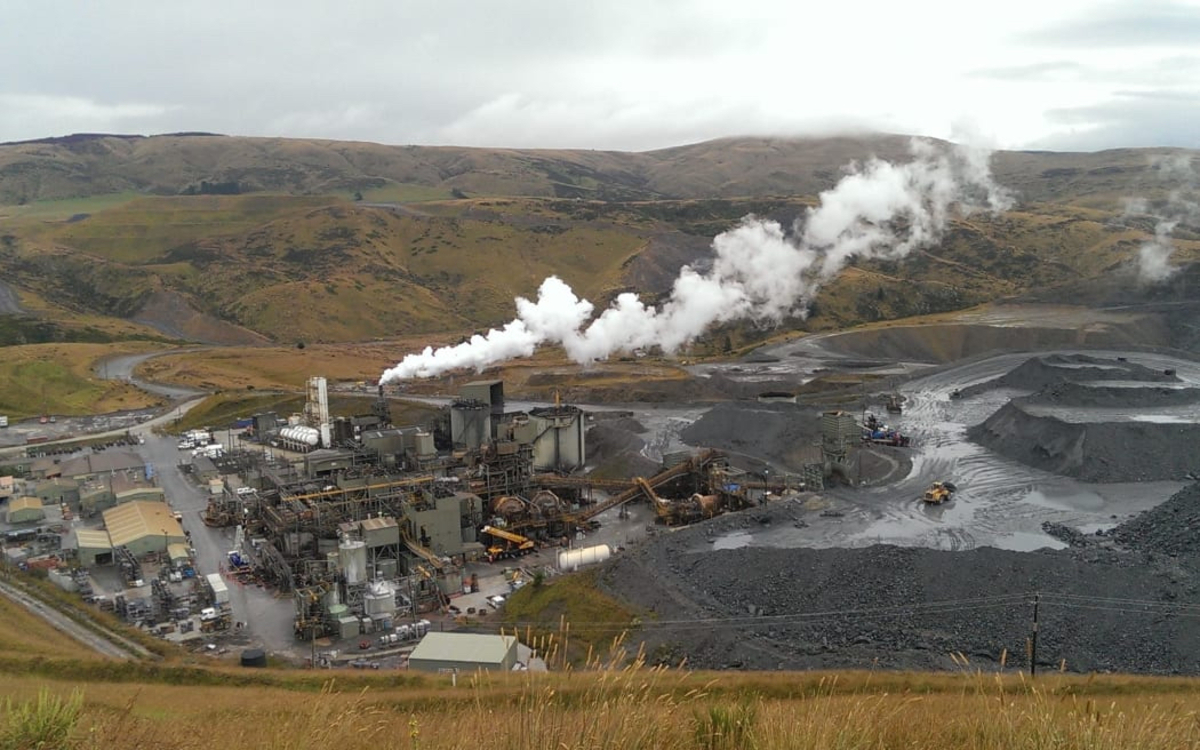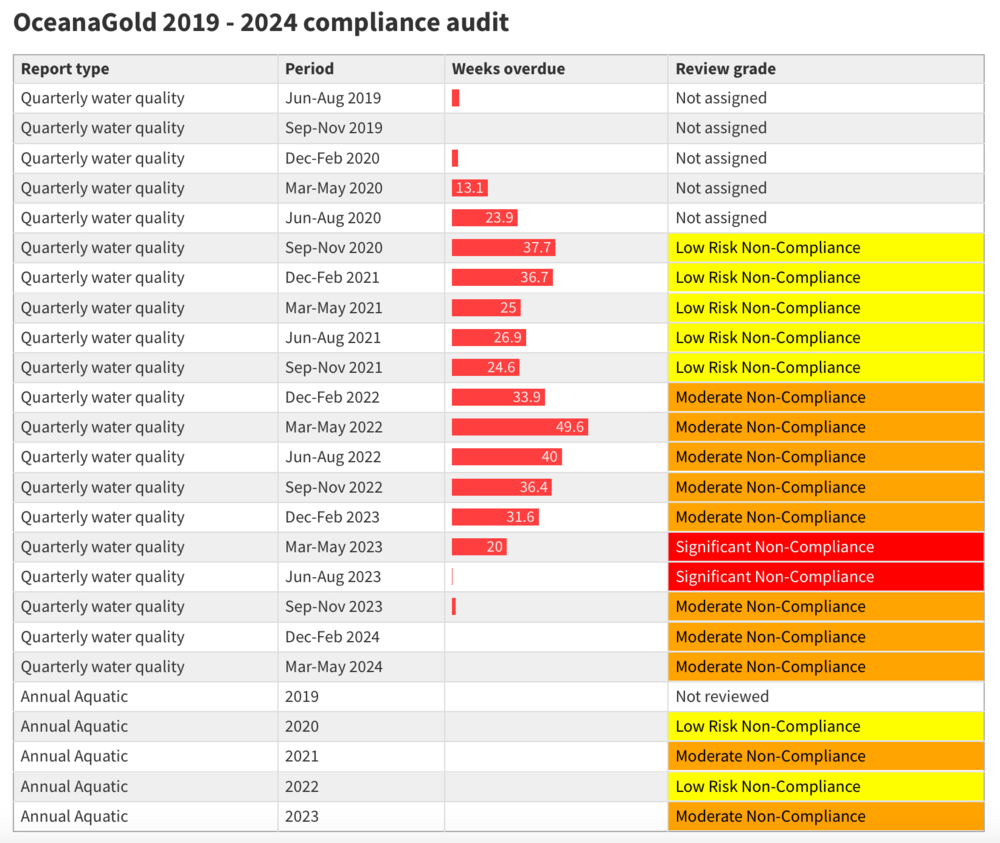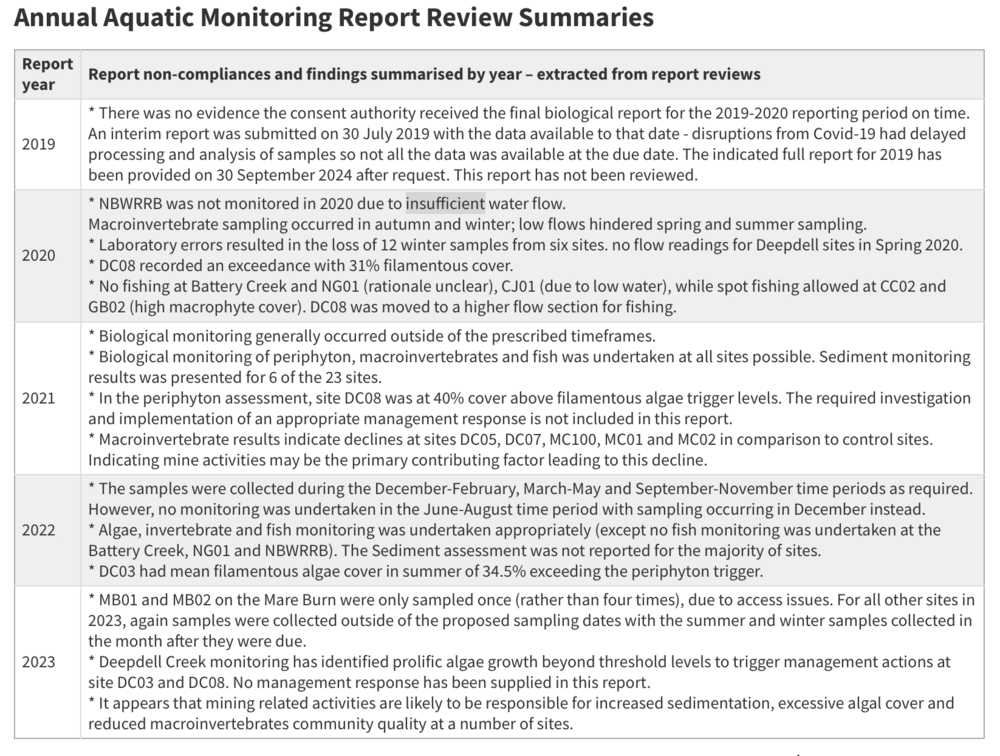Fast-tracked gold mine has shaky compliance history, audit reveals
RNZ
15 November 2024, 4:15 PM
 Macraes mine in east Otago. Photo: RNZ
Macraes mine in east Otago. Photo: RNZA gold mining company with a fast-tracked expansion project has a poor history complying with consent conditions, a regional council audit shows.
The audit of OceanaGold's Macraes mine by Otago Regional Council, completed in October, found "continued or repeated non-compliances" with several resource consent environmental monitoring conditions between 2019 and 2024.
It also found a trend of declining aquatic health in the surrounding ecosystem, but did not deem this a breach by itself.
The council did not take enforcement action against the company, which said it was working proactively with the council to improve compliance.
The Otago gold mine has been in operation since 1990 and an expansion project set for inclusion in the fast-track legislation, which passed its second reading in Parliament on Wednesday, will extend the life of the mine by a decade, from 2026 to 2036.
Green Party environment spokesperson Lan Pham said the company's past performance was disappointing.
"The fact that this level of non-compliance is going on with companies that have been put through in this fast-track process will be hugely concerning to people," Pham said.
She said the fast-track legislation's purpose - to facilitate the delivery of infrastructure and development projects with significant regional or national benefits - will give expert panels little choice but to approve projects.
Environmental considerations are not included in the bill's purpose, although panels will be able to suggest conditions of approval.
But even with stringent conditions in place, there was no guarantee these would be adhered to, or if breached, councils would take action to stop environmental harm, Pham said.

Green Party MP Lan Pham Photo: RNZ / Nate McKinnon
OceanaGold's poor results at Macraes mine included higher than allowed chemical and algae levels in water, gaps in monitoring, non-notification of when levels were exceeded, and a lack of reported action taken when limits passed a trigger point.
OceanGold also submitted most quarterly and annual reports to the council late, with one report submitted almost a year late and more than half submitted five months after they were due.
OceanaGold's senior vice president of legal and public affairs Alison Paul said there were acknowledged issues with the sampling and reporting systems, which the audit highlighted.
The company had been working proactively with the council to adhere to the conditions of consents, she said.
The company corrected issues as they arose so it could comply with consent conditions, Paul said.
"Ongoing improvements to how we manage water at Macraes reflect this commitment, with the recent audit confirming a strong track record of maintaining water quality standards at Macraes."
Otago Regional Council did not take any enforcement action against OceanaGold despite the repeated breaches.
Council compliance manager Carlo Bell said not all non-compliance resulted in enforcement action.
"It depends on the type of non-compliance that has been identified, effect of the non-compliance and the seriousness of the non-compliance."
The compliance levels in the quarterly reports ranged from a low level of non-compliance to a "significant" level, which is the highest level of non-compliance, where there are significant environmental consequences.
An action plan was put in place to improve the company's performance, Bell said.
Bell could not say if all tasks which were due to be completed had been done, but said the council was monitoring progress and meeting with the company.
The council's audit said staffing issues at OceanaGold were believed to be part of the reason for late reporting. A change in management in 2023 had improved matters.
Pham said the council had cut the company "a lot of slack".
"This isn't just someone being away from work and there being absences. This is sustained, ongoing non-compliance and then we have these companies rubber-stamped under fast track to not only continue, but expand their activities," she said. "That's the real concern."

A Flourish data visualisation
History of consent breaches
The recent audit showed a water quality limit was breached 29 times, including a recent seven-month period where sulphate levels at one monitoring spot were higher than the allowed amount. The highest level included in the audit was more than double the limit of 1000mg/l.
Non-compliance of the quarterly water quality reports ranged from a ranking of low non-compliance (five reports), moderate (eight reports) and significant (two reports). Another five reports did not have a grade assigned.
The audit said the reporting showed a trend of declining aquatic ecosystem health.
This was not considered a breach in of itself, though, as conditions in the consent were focused on monitoring.
Ecologist Mike Joy said that was "bizarre".
"Unbelievable and obviously wrong, because we should be looking at effects. The RMA is about effects, not whether you are monitoring correctly or not."
Carlo Bell said the decision on what conditions should be applied to the consents was made by an independent hearing panel.
"The compliance and monitoring schedule for the consents says that the consent holder has to investigate and implement mitigations if the aquatic biological values degrade and council's role is to make sure that this happens in line with the wording of the condition, which has
been completed through the audit process."
Investigations by OceanaGold had been completed, but these could not "conclusively" attribute the decline to mining as there were other activities taking place in the area.
"Work on this is ongoing by the consent holder,"Bell said.
The company said it was making changes to how it managed water at three locations where sampling showed declining trends in stream conditions.

A Flourish data visualisation

